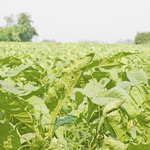
Researchers Use Tobacco Plants to Combat Ebola Outbreak
September 3, 2014| |
 Ebola virus causing hemorrhagic fever is fast spreading in some areas of Africa since December 2013 leading to over 1,000 deaths. Thus, scientists are speeding up the development of drugs and vaccines that could end the outbreak.
Ebola virus causing hemorrhagic fever is fast spreading in some areas of Africa since December 2013 leading to over 1,000 deaths. Thus, scientists are speeding up the development of drugs and vaccines that could end the outbreak.
One of the popular drugs under experimental testing is known as ZMapp developed by Mapp Biopharmaceutical in San Diego, California. In a research article published at the Proceedings of the National Academy of Sciences, the research team describes a proof-of-concept for using a mixture of antibodies to prevent lethal disease in monkeys. When administered one hour after infection, all animals survived. Two-thirds of the animals were protected even when the treatment, known as MB-003, was administered 48 hours after infection.
Kentucky BioProcessing improved the antibody efficacy using tobacco plants. The tobacco plants are "infected" with the protein known to battle Ebola and reproduce it like a photocopier. This new development process significantly decreases the amount of time required for production, increases the quantity of antibody produced, and reduces the cost of manufacturing.
ZMapp is not yet approved for use but drug approval testing protocols are expected to be implemented this year.
Read more at http://www.mappbio.com/ebola.html, http://goo.gl/fXwBoQ, and http://www.kentucky.com/2014/08/04/3365612_drug-given-to-american-ebola-victims.html?sp=/99/322/&rh=1.
| |
Biotech Updates is a weekly newsletter of ISAAA, a not-for-profit organization. It is distributed for free to over 22,000 subscribers worldwide to inform them about the key developments in biosciences, especially in biotechnology. Your support will help us in our mission to feed the world with knowledge. You can help by donating as little as $10.
-
See more articles:
-
News from Around the World
- Cornell Launches Global Initiative for Science-based Communication on Agri-biotech
- Swaziland Minister Encourages Farmers to Accept Biotech Crops
- Water 'Thermostat' Gene Could Help Develop Drought Resistant Crops
- India's Agri Minister Pitches for Biotech Crops to Achieve Second Green Revolution
- Vietnam Grants Licenses to Four GM Corn Varieties
- FSAI Head Says Europe Must Put Aside Fears of GM Technology
-
Research Highlights
- Mutated BRI1 in Uzu Barley Can Provide Disease Resistance
- Researchers Map Several QTLs for Maize Gray Leaf Spot Resistance
- Scientists Evaluate Insect Resistant Plants Expressing Spider Venom Toxin (Hvt)
-
Beyond Crop Biotech
- Uppsala University Researchers Release Sequence of Honeybees' Genome
- Researchers Use Tobacco Plants to Combat Ebola Outbreak
-
From the BICs
- Seminar on Socio-Economic Considerations on Agri-biotech Concludes in Bogor, Indonesia
- RTD for Media Practitioners in Jakarta "A Tribute to the 69th Anniversary of the Republic of Indonesia from Biotechnology Community"
-
Announcements
- World Congress on Root and Tuber Crops
- Next Generation Sequencing Technologies for Crop Improvement Course
-
Read the latest: - Biotech Updates (February 18, 2026)
- Gene Editing Supplement (January 28, 2026)
- Gene Drive Supplement (February 22, 2023)
-
Subscribe to BU: - Share
- Tweet
